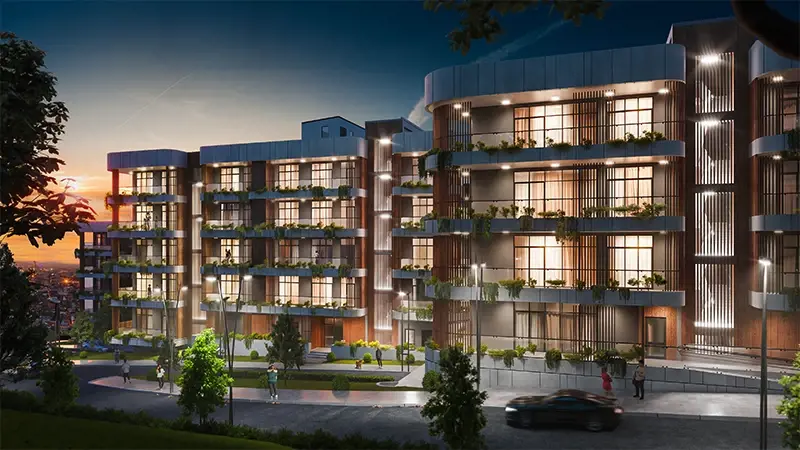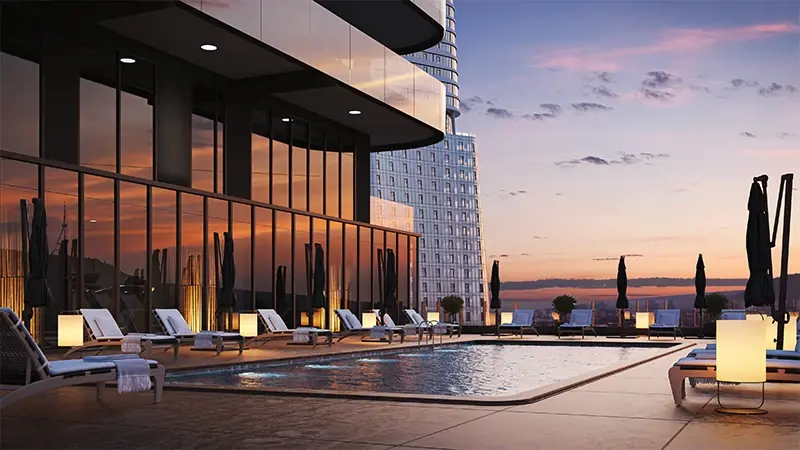FAQ: Everything You Need to Know About Modern Apartment Complexes in Georgia
#Other
FAQ: Everything You Need to Know About Modern Apartment Complexes in Georgia
Georgia’s urban housing market is maturing and doing it fast, especially in the two largest cities: Tbilisi and Batumi. The new-build apartment complexes with multiple on-site amenities are now considered the prime piece to acquire, both for everyday living and investment, not-so-slowly and quite surely diverting buyer attention from regular apartment buildings that had dominated the development up until now.
In this FAQ we’ll be answering the most oft-asked question we tend to get about apartment complexes in Georgia, so you can be well-armed when comparing options, evaluating possible returns, and deciding whether investing in one is worth it based on solid data, not hearsay.
1) What is the meaning of an apartment complex?
An apartment complex is a multi-unit residential property operated as one community: not just apartments spread across one or, commonly, multiple buildings but shared infrastructure—security, parking, elevators, green spaces, additional amenities—operating under unified management.
2) How would you describe a modern apartment complex in Georgia?
What Georgian developers, specifically, mean when advertising “modern” apartment complexes typically refers to higher quality energy-efficient construction, secure access (CCTV/concierge), basic amenities like elevators and underground parking, and often additional lifestyle infrastructure such as fitness rooms, children’s play areas, and green courtyards. These types of projects are currently most common in highly developed areas of Tbilisi’s where developers have to compete more ardently for buyer interest, like Saburtalo district (To further gauge district-specific buyer interest, compare Saburtalo apartments listings—it’ll help you create a clearer picture of how amenity depth maps to asking rent).
Archi’s own project Lisi Sunrise is a good example: the residential buildings are low-rise, built with energy-efficient YTONG blocks and are surrounded by a 15,000 sq.m. green yard and multiple leisure facilities. If you’re looking for an investment property rather than a residential one, you might want to read our Tbilisi property market analysis to learn more about how such features affect possible ROI.
3) Apartment complex vs apartment building—what’s the difference?
The short answer: scale and services. An apartment complex vs an apartment building usually provides more and better services, largely because the multi-building operations allow spreading costs for security, landscaping, and on-site management across more units, stabilizing NOI and reducing churn. That’s harder to achieve in a small stand-alone building. That said, sometimes the developer may smudge the meanings in the hope of attracting more clientele, so be sure to ask in-depth questions if this part is important to you. Any reputable real estate development company with a large portfolio will be transparent about how they classify their projects and what amenities their complexes come with vs. singular buildings.

4) How much does it cost to invest in apartment complex units in Georgia?
Most private investors prefer buying into new apartment complexes rather than acquiring and renovating old ones (unless it’s a historic building in a historic center—which is a whole other specific case).
Capital entry depends on the district and the finish level. In Tbilisi, 2025 reporting shows primary-market prices vary materially by district; currently, the white-frame apartments for sale in Tbilisi span roughly in the low-$1,000s to the mid-$2,000s per m² across major districts. TBC Capital’s 2024–2025 monthly watches show Tbilisi’s citywide averages trending around the low-$1,200s per m², with the center higher and peripheries lower.
5) Is buying into an apartment complex a good investment?
In short: yes. On yield, Georgia remains competitive by European standards. Independent tracking shows average gross rental yields around ~7.5%–7.9% in 2025, with city differences by size/location. In Tbilisi specifically, post-2022 heat has normalized at healthy levels, supported by steady end-user demand. District data indicates depth where new supply is concentrated (e.g., Saburtalo, Didi Dighomi). In fact, currently, the best real estate investment in Georgia seems to be the complexes offering extra amenities—security, green courtyards, functional gym, access to transportation—as rents in these developments remain resilient and vacancy rates stay low, supporting risk-adjusted ROI over stand-alone older stock.
6) Where do apartment complexes in Tbilisi show strong demand and pricing today?
Recent monthly watches indicate the bulk of transactions concentrated in Didi Dighomi and Saburtalo, with continued price momentum in Isani and stable liquidity in Nadzaladevi.
Galt & Taggart’s district tables for April–May 2025 show primary-market price bands that consistently place Saburtalo in the upper mid-tier, with Isani/Nadzaladevi offering value entries and Didi Dighomi leading by volume (hence resale liquidity).
A great example in Saburtalo district would be our own Archi King Tamar. Situated on a central corridor with transit access—with location and connectivity playing key roles along with amenities in bolstering interest.
7) Which amenities of an apartment complex can influence future ROI?
In Tbilisi, the consistent “ROI drivers” seem to be secure entry & CCTV, reliable elevators and backup power, and underground parking—these are the minimums that a modern renter demands. A usable gym (not a token room), and a large yard that families can actually use seem to come right after. These support rent premiums and lease renewals.
A good example of what a premium-class apartment complex with family-oriented amenities should look like would be Archi Rivertown in Dighomi—the substantial green space and community infrastructure match local demand for larger, livable environments.
8) What’s the ROI difference between apartment complex assets and a single older building?
On paper, older stand-alone buildings can show higher percentage yields due to lower entry prices. But they often carry higher capex risk and more vacancy. Large apartment complexes benefit from economies of scale and amenities that tenants pay for (reducing churn and boosting ROI).
City data for 2025 places Tbilisi’s typical gross yields around the high-6s to high-7s, depending on size/district, while Batumi’s distribution is broader because of seasonality (peaks in summer).
If you model both options, load your pro-forma with HOA + amenity OPEX and a realistic lease-up. Many investors find that risk-adjusted ROI favors modern complexes—especially in districts like Saburtalo or Dighomi, where data shows demand holds steady—over singular older blocks.
9) How do apartment complexes in Batumi perform vs Tbilisi?
While the year-round residency in Batumi is up (and looks to go even higher), it still remains primarily a resort city. The yields may look stronger than Tbilisi, especially for apartments in Batumi with sea view in peak months, but occupancy is seasonal.
Global snapshots put Georgia’s 2025 gross yields near ~7.5%–7.9%, and that data seems to hold for Batumi as well—but it’s more volatile across the year, with peaks higher and drops lower.
To mitigate the risks, some investors have chosen to strengthen their peak season returns by banking on the brand recognition and buying into projects like Archi Ramada Batumi—not so much a standard apartment complex, rather a branded aparthotel with pooled management—built for short-stay demand and operated in partnership with Ramada Encore by Wyndham, the strong brand is meant to stabilize cash flows across the season.
10) Can foreigners buy and manage an apartment complex (or units in one) in Georgia?
Yes—Georgia’s framework allows non-residents to own apartments and buildings (agricultural land is the main exception). Registration is digital and fast; many transactions are complete in a handful of days. Note: always verify current rules and taxes before closing.
Get started with a legal explainer on can foreigners own property in Georgia for basic information on documentation, tax, and registration, then get in touch with a lawyer so they can instruct you more in-depth.
11) Where can I find an apartment complex for sale or apartment complexes for sale?
It’s pretty easy to buy property in Georgia, Tbilisi in a modern apartment complex—if we’re assuming that’s what you mean when looking for “apartment complexes for sale” similar to many others who forget to specify it’s an apartment they want, not an entire building. If, however, you’re one of the 0.1% looking for the apartment complex itself, not a singular apartment (or a few units, at most)—you’ll have your work cut out for you.
Whole-building deals tend to circulate via commercial brokers and developer sales teams; more often you’ll assemble a portfolio by buying multiple units within one complex. Track broker lists and primary-market launches and monitor off-plan phases where block/floor purchases are negotiable. Try parsing for phrases like apartment complex investment for sale in commercial portals; they may help you discover some income-property opportunities.

12) What operating costs and HOA fees should I expect in an apartment complex?
Model three buckets: (1) HOA/amenities (security, elevators, landscaping), (2) unit-level maintenance and reserves, (3) management fees if you outsource leasing. In a well-run complex, amenity premiums typically offset fees through higher rent and lower vacancy—especially in family-leaning districts like Dighomi or Nadzaladevi (you can check projects like Archi Kikvidze Garden as an example). District rent tables from the 2025 market watch are useful guardrails when you forecast NOI. Proximity to transport and developing retail helps stabilize occupancy while keeping entry prices moderate.
13) What due diligence should I do before investing in an apartment complex?
Beyond title and permits, confirm: (a) delivery condition (white/green frame), (b) developer’s materials (e.g., insulation blocks, windows) and warranties, (c) real, usable amenity specs versus brochure renderings, and (d) service-level KPIs if using third-party management.
For a step-by-step reference, you can read our guide to buying a house in Georgia.
14) What are typical rents & yields by district for apartment complexes in Tbilisi?
Galt & Taggart’s April–May 2025 tables show primary-market prices and district rent levels moving in bands—Saburtalo in the upper mid-tier by price, Didi Dighomi leading by volume (liquidity), Isani and Nadzaladevi offering value entries with improving infrastructure.
TBC Capital’s monthly watch also highlights that Didi Dighomi and Saburtalo consistently account for a large share of transactions, a signal for both depth and exit options. If you’re weighing cash-flow vs. appreciation, combine these tables with current rental yield snapshots (Tbilisi in the mid-to-high-7s on average; unit size and exact location drive the spread).
15) What is the practical, step-by-step way to buy units in an apartment complex in Georgia?
Here’s how a typical process looks: shortlist a unit → reserve/SPA → notary → Public Registry → handover → lease-up and management. Verify that the complex’s permits and delivery conditions match your budget (fit-out, appliances, furnishing) and set a standard finish pack if you’re acquiring multiple units—this speeds lease-up and keeps your inventory interchangeable.
If you’re considering buying into resort projects (e.g., managed aparthotels like the abovementioned Archi Ramada or Sioni Lake Resort & Spa created in partnership with Le Meridien), ask the developer to provide in-depth information about how the project will be managed/operated: the rental program rules, fee stack, and seasonality assumptions.







